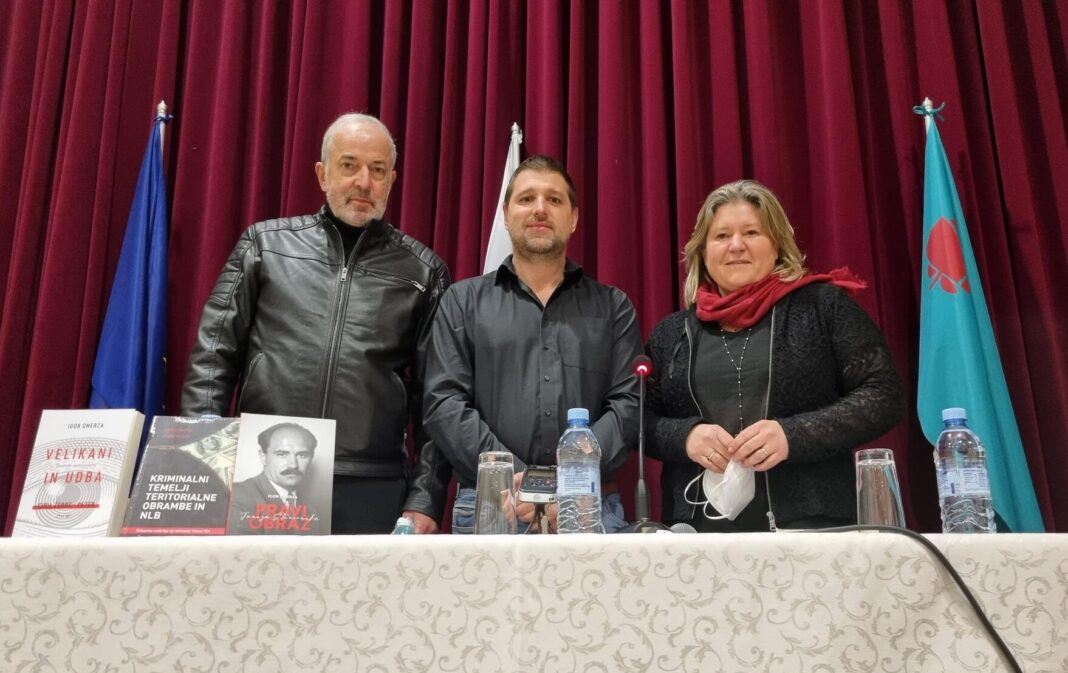By: M. Bo.
Demokracija Magazine Tour or All-Slovenia Tour of Nova Obzorja Publishing House stopped in Šempas this time, where the presentation of the books “Vzporedni mehanizem globoke države” (“Parallel Mechanism of the Deep State”) by Rado Pezdir and “Velikani slovenske osamosvojitve in UDBA” (“Giants of Slovenian Independence and UDBA”) by Igor Omerza took place today. The discussion evening was led by Gorizia cultural worker and journalist Erika Jazbar.
Publicist and researchers Rado Pezdir and Igor Omerza met about six years ago in the Archives of the Republic of Slovenia and immediately found out that their fields of research overlap. Together they wrote the book “Kriminalni temelji teritorialne obrambe in NLB”. While Omerza focuses more on the political aspects of researching history, which he describes in the book “Velikani slovenske osamosvojitve in UDBA: Ciril Žebot – Peter – Prvi del”, Pezdir is mainly concerned with economics; in his book “Vzporedni mehanizem globoke države” he describes the functioning of the Udba-party parallel economic system, which prevented a healthy transition in Slovenia.
Hos Erika Jazbar was interested in how it all started, and Pezdir replied that the beginnings date back to a time when it was not yet known what would happen to Trieste. It was then that the idea arose to take advantage of Slovenian companies in the Trieste area and establish a communist network. Due to Italian control, they looked for other routes and found them; Udba established an economic department headed by Niko Kavčič, and this department had its legal and illegal part. Udba, which after the war persecuted everything that smelled of capitalism and consequently destroyed Slovenia’s business infrastructure, needed money – and began smuggling cigarettes.
Vosov’s liquidators became capitalists
‘Stars’ such as Niko Kavčič, Ivan Maček – Matija, Edo Brajnik, Janez Zemljarič, Drago Isajlović, Miloš Ogrizek, Ivan Pušnik, etc., have grown up on this party-Udba parallel mechanism. “They were Vosov’s liquidators who had just come out of the woods, they did not know what financial engineering was,” says Pezdir, adding that over time they learned and caught up with criminals from Switzerland and mobsters from Italy. There is documentation showing how they debated financial speculation, tax burdens, etc., in short, a typical capitalist narrative, Pezdir added.
They needed capital, so they went into state smuggling and crime, Omerza continued, and to a very large extent. “They flooded the whole Italy with cigarettes,” he said, adding other examples, such as money laundering in New York and coastal casinos. According to him, the Slovene Udba has always focused on foreign countries, not only Italian, but also Austrian and to a lesser extent Hungarian. Abroad, it also operated as a state-terrorist organisation, i.e., persecuting people, carrying out assassinations and the like, which was very harmful to Slovenian minorities.
Edo Brajnik, an important Udba member, contacted the Israeli Mossad, and this connection grew into business cooperation, which took place secretly even after Yugoslavia and Israel severed all diplomatic contacts. In the second half of the 1990s, Simon Perez invited Milan Kučan and Darko Horvat to celebrate his 80th birthday, but in the early 2000s, Israeli companies merged with Horvat’s Aktiva from this secret alliance and money began to flow…
Will there be an epilogue?
After independence, the social money that was poured abroad began to come back to Slovenia and during the privatisation strengthened the centres of power, especially in the fields of media, medical equipment, and banking, while the NLB flooded the network with money… As we know, we all ended up paying a 5 billion bank hole together. Nothing has gotten a real epilogue, including the affair of laundered Iranian billions, and Pezdir believes banking crime probably will not get him either, “which is a shame”; in the police, prosecution, and judiciary, “people are retarded”.
“A political force that is not capable of condemning the parallel mechanism of networks and banking will certainly not lead Slovenia into a bright future, but into a septic tank,” Pezdir is convinced.

